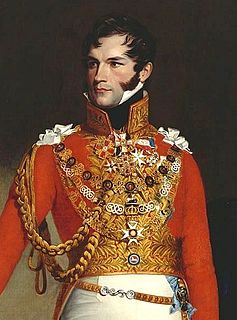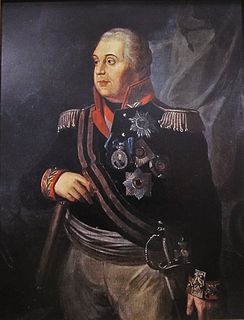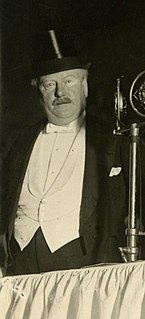
Konstantin Ustinovich Chernenko was a Soviet politician and the fifth General Secretary of the Communist Party of the Soviet Union. He led the Soviet Union from 13 February 1984 until his death thirteen months later, on 10 March 1985. Chernenko was also Chairman of the Presidium of the Supreme Soviet from 11 April 1984 until his death.

Sir Mackenzie Bowell was a Canadian newspaper publisher and politician, who served as the fifth prime minister of Canada, in office from 1894 to 1896.

The United States Attorney General (A.G.) is the chief lawyer of the Federal Government of the United States, head of the United States Department of Justice per 28 U.S.C. § 503, and oversees all governmental legal affairs.

Edward VII was King of the United Kingdom of Great Britain and Ireland and Emperor of India from 22 January 1901 until his death in 1910.

Wilhelm II was the last German Emperor (Kaiser) and King of Prussia, reigning from 15 June 1888 until his abdication on 9 November 1918 shortly before Germany's defeat in World War I. He was the eldest grandchild of Queen Victoria of the United Kingdom and related to many monarchs and princes of Europe, most notably his first cousin King George V of the United Kingdom.

Leopold I was a German prince who became the first King of the Belgians following the country's independence in 1830. He reigned between July 1831 and December 1865.

The Order of Australia is an order of chivalry established on 14 February 1975 by Elizabeth II, Queen of Australia, to recognise Australian citizens and other persons for achievement or meritorious service. Before the establishment of the order, Australian citizens received British honours.

Prince Henry, Duke of Gloucester, was the third son and fourth child of King George V and Queen Mary. He served as Governor-General of Australia from 1945 to 1947, the only member of the British royal family to hold the post.

Prince Mikhail Illarionovich Golenishchev-Kutuzov was a Field Marshal of the Russian Empire. He served as one of the finest military officers and diplomats of Russia under the reign of three Romanov Tsars: Catherine II, Paul I and Alexander I. His military career was closely associated with the rising period of Russia from the end of the 18th century to the beginning of the 19th century. Kutuzov is considered to have been one of the best Russian generals.

Friedrich Wilhelm Ernst Paulus was a German field marshal during World War II who commanded the 6th Army during the Battle of Stalingrad. The battle ended in disaster for the Wehrmacht when Soviet forces encircled the Germans within the city, leading to the ultimate defeat and capture of about 265,000 German personnel, their Axis allies and collaborators.

Elliot Lee Richardson was an American lawyer and politician who was a member of the cabinet of Presidents Richard Nixon and Gerald Ford. As U.S. Attorney General, he was a prominent figure in the Watergate Scandal, and resigned rather than obey President Nixon's order to fire special prosecutor Archibald Cox.

Ernest Augustus, Crown Prince of Hanover, 3rd Duke of Cumberland and Teviotdale, was the eldest child and only son of George V of Hanover and his wife, Marie of Saxe-Altenburg. Ernst August was deprived of the thrones of Hanover upon its annexation by Prussia in 1866 and later the Duchy of Brunswick in 1884. Although he was the senior male-line great-grandson of George III, the Duke of Cumberland was deprived of his British peerages and honours for having sided with Germany in World War I. Ernst August was the last Hanoverian prince to hold a British royal title and the Order of the Garter. His descendants are in the line of succession to the British throne.

Dong Zhuo, courtesy name Zhongying, was a military general and warlord who lived in the late Eastern Han dynasty of China. He seized control of the capital Luoyang in 189 when it entered a state of turmoil following the death of Emperor Ling of Han and a massacre of the eunuch faction by the court officials led by General-in-Chief He Jin. Dong Zhuo subsequently deposed Liu Bian and replaced him with the puppet Emperor Xian of Han. Dong Zhuo's rule was brief and characterized by cruelty and tyranny. In the following year, a coalition of regional officials and warlords launched a Campaign against Dong Zhuo. Failing to stop the coalition forces, Dong Zhuo sacked Luoyang and relocated further west to Chang'an. He was assassinated soon after in 192 by his subordinate Lü Bu in a plot orchestrated by Interior Minister Wang Yun.

Helmuth Karl Bernhard Graf von Moltke was a Prussian field marshal. The chief of staff of the Prussian Army for thirty years, he is regarded as the creator of a new, more modern method of directing armies in the field. He is described as embodying "Prussian military organization and tactical genius." He is often referred to as Moltke the Elder to distinguish him from his nephew Helmuth Johann Ludwig von Moltke, who commanded the German Army at the outbreak of World War I.

John McAllister Schofield was an American soldier who held major commands during the American Civil War. He later served as U.S. Secretary of War under Presidents Andrew Johnson and Ulysses S. Grant, and Commanding General of the United States Army.

William Donald Ross, was a financier, banker and the 14th Lieutenant Governor of Ontario.

The Camillians or Clerics Regular, Ministers to the Sick are a Roman Catholic religious order, founded in 1582 by St. Camillus de Lellis (1550-1614). A large red cross was chosen by the founder as the distinguishing badge for the members of the Order to wear upon their black cassocks, which was later adopted as the international symbol of medical care. As of 2018, 1080 Camillians serve in 35 countries. They use the postnominal initials of M.I..

Prince Frederick Charles Alexander of Prussia was a younger son of Frederick William III of Prussia. He served as a Prussian general for much of his adult life and became the first Herrenmeister of the Order of Saint John after its restoration as a chivalric order. Nevertheless, he is perhaps remembered more often for his patronage of art and for his sizable collections of art and armor.

Archduke Franz Ferdinand, Archduke of Austria-Este was a member of the imperial Habsburg dynasty, and from 1896 until his death the heir presumptive (Thronfolger) to the Austro-Hungarian throne. His assassination in Sarajevo precipitated Austria-Hungary's declaration of war against Serbia, which in turn triggered a series of events that resulted in Austria-Hungary's allies and Serbia's declaring war on each other, starting World War I.

The Illuminati is a name given to several groups, both real and fictitious. Historically, the name usually refers to the Bavarian Illuminati, an Enlightenment-era secret society founded on 1 May 1776. The society's goals were to oppose superstition, obscurantism, religious influence over public life, and abuses of state power. "The order of the day," they wrote in their general statutes, "is to put an end to the machinations of the purveyors of injustice, to control them without dominating them." The Illuminati—along with Freemasonry and other secret societies—were outlawed through edict by the Bavarian ruler Charles Theodore with the encouragement of the Catholic Church, in 1784, 1785, 1787, and 1790. In the following several years, the group was vilified by conservative and religious critics who claimed that they continued underground and were responsible for the French Revolution.




















